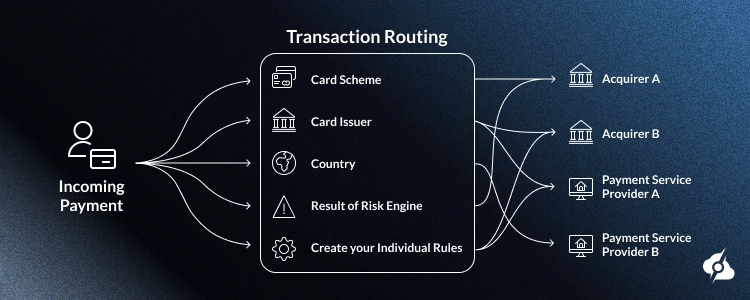Smart Routing Explained: Intelligent Network Optimization

The way payments move can have a major impact on whether businesses’ operations run smoothly or struggle with repetitive issues. Everything from failed transactions and car payments in Fintech to real-time gaming and CDNs depends on the level of efficiency at which data is routed.
This is where smart routing comes in. This is a technology that elevates transaction data, network paths, and routing rules in real time to reduce cost, cut down on declined transactions, and ultimately boost customer satisfaction.
With more than two decades of proven expertise, ServerMania helps organizations put this technology into practice. We offer high-level services, including dedicated server hosting, IP leasing solutions, and GPU dedicated servers designed for intensive data processing.
At ServerMania, we provide infrastructure that powers smart routing at scale.
In this guide, we’ll break down what smart routing is, how it works across industries, and the benefits it brings to both customers and businesses.
What is Smart Routing?

In short, smart routing automatically sends traffic (data, requests, or transactions) over the fastest, most reliable path. Instead of fixed routes, it picks the best path in real time to minimize delays and bottlenecks.
The impact of smart routing grows beyond Fintech. In 2026, smart routing payments mean fewer failed transactions and higher approval rates for e-Commerce platforms, low latency in streaming and gaming, and smooth performance for cloud providers and CDN operators.
The smart routing system is extremely efficient regardless of whether you’re growing your business’s efficiency, optimizing payment flows, or handling high-value transactions. Such a technology helps any organization elevate its performance, reaching its business goals and gaining a real competitive edge.
Types of Smart Routing
Smart routing comes in various shapes, and different organizations deploy it in unique ways to boost performance and align with their specific requirements.
Here are the primary types of smart routing systems and how they work:
Payment Smart Routing
In Fintech and e-Commerce, smart routing is used to automatically route transaction data and card payments to the best available payment providers or acquiring banks. Nowadays, businesses analyze many aspects such as customer data, authorization rates, and transaction amounts, allowing them to route payments most effectively. This reduces the number of failed payments, minimizing fees and boosting customer satisfaction.
Content Delivery and CDN
For many media companies, streaming platforms, and even CDN operators, the smart routing system verifies that the digital data (audio and video) uses the fastest available path. This enables a dynamic selection of a network path, which reduces latency, decreases buffering, and guarantees performance.
Ultimately, this leads to more customer clicks and a large volume of successful network traffic on the websites, platforms, and web applications.
Gaming & Real-Time Routing
The gaming infrastructure managers and developers solely rely on real-time applications to keep up with the lag, especially during multiplayer gaming. In 2026, the competitive gaming industry has grown so large that smooth gameplay will be the highest priority for many organizations.
Intelligent routing systems choose the lowest-latency routes to deliver minimal ms while gaming and provide fewer disruptions, near real-time responses, and a competitive edge.
Enterprise and Cloud Routing
Many enterprises, IoT developers, and even cloud service providers deploy smart routing to elevate the efficiency of their workloads, especially in multi-cloud environments and data centers. Many businesses rely on low latency and guaranteed network uptime to lower costs, handle high-value transactions, and ultimately achieve their business targets without an obstacle.
See Also: BGP Routing Explained: The Complete Guide
How Does Smart Routing Work?
Smart routing extends the capabilities of Border Gateway Protocol (BGP), which is the way the system safeguards data while being moved across networks. This is important because, instead of only looking for the shortest possible path, smart routing systems take into account factors like lag, fees, and past records to evaluate the best route.
The goal is to deliver data or transactions faster, cheaper, and with fewer failures.

Smart Routing Payments and Fintech
For Fintech, smart routing is a game-changer as it directs card payments to the payment processor that has the best chance to approve it (checks approval rates). In case, however, a transaction still fails, the system automatically reroutes the payment through another processor, which avoids potential failures.
This not only improves the acceptance rates, but also decreases the fees and keeps customers happy!
Smart Routing for CDN and Streaming
In the streaming world and content delivery networking, smart routing just keeps the traffic away from any congestion by selecting the servers with the lowest latency. This not only reduces lag and delay but also guarantees smooth streaming performance.
Smart Routing in Gaming, Cloud, and IT
For gaming and big-scale enterprise workloads, the smart routing technology aims to minimize the lag by rerouting network packets around network spikes. Ultimately, it balances the traffic in the best way possible, which keeps the critical application running without failure.
Here is a quick overview:
| Use Case | What It Optimizes | Key Benefits |
|---|---|---|
| Smart Routing Payments & Fintech | Directs transactions to the best bank or processor. | Fewer failed payments, higher approval rates, lower fees. |
| CDN & Streaming | Chooses the lowest-latency delivery paths. | Reduced buffering, smoother playback, better customer experience. |
| Gaming & Multiplayer | Routes through lowest-latency networks. | Less lag, stable sessions, improved customer journey. |
| Enterprise & Cloud | Balances workloads across data centers/cloud. | Lower costs, higher efficiency, and reliable uptime. |
Intelligent Routing: Speed, Cost, and Reliability
In fintech, every transaction depends on three things: speed, cost, and reliability. Smart routing improves all three by cutting latency, lowering fees, and keeping payments flowing.
First and foremost, smart routing supercharges the speed of your transactions. By dynamically selecting the most efficient pathways, it reduces latency to a minimum, ensuring that your financial data reaches its destination at lightning speed. This is a serious upgrade for companies looking to gain an edge in finance, where every millisecond can make a difference.
Smart routing also has a significant impact on cost optimization. Intelligently choosing the most cost-efficient routes for your transactions leads to substantial savings over time.
However, as fintech companies seek to embrace smart routing, concerns may arise. These concerns often revolve around the complexity of implementation, security, and scalability. It’s essential to choose server hardware that can seamlessly integrate smart routing solutions, offer robust security measures, and scale alongside your growing needs. Find out more about ServerMania Security and how we protect you and your customers’ sensitive financial data and information.
How to Set Up Smart Routing Payments
As we’ve learned, smart routing allows customers and businesses alike to send transactions through the fastest and efficient path available. The main purpose of it is to decrease declines and boost payment experience, which is something that many businesses rely on in today’s digitalization.
By connecting directly with multiple accepting banks and payment processors, organizations can offer customer choice, lower customer queries, and decrease costs.
This not only generates more revenue but also builds trust, so here is how to set up smart routing:
- Transaction Parameters: First, you need to consider the payment method, transaction amount, card issuer, and location to guide routing decisions.
- Define the Routing Rules: Once you’ve acquired the parameters, you need to deploy them and find out which processors to prioritize for different payments.
- Multiple Payment Providers: Enabling connections to a wide array of processors is critical for many businesses that handle a large volume of daily transactions.
- Implement Decision Making: The smart routing also provides real-time decision making, which can read and evaluate live data to route payments dynamically.
- Add Fallback Mechanisms: A failover system is a must, and smart routing can provide you with many alternative channels to reroute failed payments.
- Monitor and Optimize: Ongoing and continuous tracking of transaction data is necessary to refine and optimize your routing rules to achieve the highest business efficiency.
- Compliance and Security: The routing system you design must be built to meet the regulatory standards and protect sensitive financial information.
Smart Routing vs Traditional Routing
Traditional routing relies on fixed paths and predetermined rules, sending transactions or data along a set route regardless of network conditions or payment performance. While simple, this approach often leads to disgruntled customers, failed payments, and limited flexibility.
Businesses using traditional routing have fewer tools to analyze data in real time or adjust paths based on evolving conditions, which can hinder cost effectiveness and reduce customer satisfaction.
Smart routing, on the other hand, uses dynamic algorithms to make informed decisions about payment routing and network paths. It considers multiple factors, such as transaction parameters, processor performance, and latency, allowing companies to boost acceptance rates, offer customers choice, and optimize contact channels for any issues that arise. By constantly adapting, smart routing improves efficiency and helps businesses maintain a competitive edge.
| Traditional Routing | Smart Routing | Improvement / Impact | |
|---|---|---|---|
| Path Selection | Static or shortest path, ignores network conditions. | Dynamic and optimal, it evaluates latency, processor performance, and fees. | Up to 40% faster delivery, fewer failed payment processes. |
| Adaptation | None; fixed routes regardless of traffic. | Real-time analysis of network congestion and transaction information. | Instant response reduces delays and disgruntled customers. |
| Failover | 30–60 seconds to switch paths. | <1 second; automatically reroutes declined transactions. | 98% faster recovery improves the route payment experience. |
| Cost Awareness | No visibility into fees or efficiency. | Monitors transaction costs, routes payments cost-effectively. | 35% savings on payment routing, higher revenue. |
| Load Distribution | Basic, static distribution across channels. | Intelligent balancing based on traffic and processor capacity. | 3x efficiency, better operational performance. |
| Customer Choice | Limited options; fixed processors. | Offers customers a choice of payment methods and channels. | Higher satisfaction, fewer customer queries. |
| Analytics & Tools | Minimal monitoring or other tools. | Uses analytics for much better routing decisions on routing rules. | Enables smarter strategies and continuous optimization. |
| Contact Channels | More support is needed due to failed payments. | Reduced support load with smooth transactions. | Fewer escalations, better customer experience. |
Technical Components & Architecture
Smart routing relies on a combination of software, hardware, and network intelligence to deliver reliable, cost-effective payment routing, low-latency information delivery, and seamless customer experiences. Its architecture is designed to handle large volumes of transactions and network requests, while providing flexibility, security, and real-time decision-making.
Core Routing Engine
The routing engine is the brain of the system, continuously analyzing transaction data, payment method performance, and network conditions. It makes real-time decisions to route payments, optimize paths, and minimize declines.
By integrating with acquiring banks, processors, and using many tools, it ensures that both customers choose their preferred methods and businesses can maintain revenue and operational efficiency.
Network & Infrastructure
A robust network setup underpins smart routing, using servers, data centers, and cloud hosting to deliver low-latency, high-availability performance. Key elements include:
- BGP peering for dynamic path selection
- Direct linking to the payment processors
- Redundant servers for failover and uptime
Analytics and Integration
Smart routing systems include monitoring and analytics to track approval rates, failed transactions, and routing efficiency, enabling better decisions and continuous optimization.
Security layers protect customers and sensitive transaction information, while APIs connect the system to many tools, payment providers, and cloud services for scalable and flexible operations.
Here’s a technical component summary:
| Function / Purpose | Key Benefits | |
|---|---|---|
| Routing Engine | Real-time path selection and payment routing. | Faster approvals, fewer failed payment processes. |
| Network Infrastructure | Servers, BGP peering, direct connections. | Low latency, high availability, and cost-effective. |
| Analytics Layer | Monitoring transactions and network performance. | Informed decisions, optimized customer experience. |
| Security & Compliance | Encryption, authentication, and regulatory adherence. | Protects customer information, reduces risk. |
| API & Integration Layer | Connects to payment processors, banks, and other tools. | Scalable, flexible, and supports multiple payment methods. |
Performance Metrics & Benchmarks
Smart routing significantly enhances performance across multiple sectors, including fintech, streaming, and content delivery. Here’s how:
Fintech & Payment Routing
- Transaction Success Rates: Intelligent routing can boost cascading payment success rates by up to 20% by directing transactions through the most reliable processors.
- Cost Reduction: By selecting the most cost-effective routes, businesses can reduce processing fees, leading to substantial savings.
- Real-Time Decision Making: Advanced algorithms enable instant rerouting, minimizing cascading payment declines and improving customer satisfaction.
Source: Financial IT
Streaming & CDN Performance
- Latency Reduction: Smart routing decreases latency by up to 40%, enhancing user experience during peak traffic periods.
- Bandwidth Optimization: Efficient routing ensures optimal bandwidth usage, preventing congestion and maintaining stream quality.
- Availability Improvement: By dynamically adjusting routes, systems can achieve higher availability, ensuring uninterrupted smart routing, payments, and service.
Source: Blazing CDN
Industry Benchmarks
According to a report by Razorpay, payment gateways like Cybersource and PayU have varying success rates, emphasizing the importance of selecting the right processor for each transaction.
Source: Razorpay
Final Thoughts

Smart routing is essential across many industries, ranging from Fintech and e-Commerce to streaming, gaming, and enterprise IT. This revolutionary technology ensures speed, reliability, and cost-effective operations by optimizing the payment process, content delivery, and network traffic.
Implementing smart routing means analyzing transaction information and routing rules, integrating with multiple banks and payment processors, and real-time decision-making with fallback mechanisms.
For streaming and high-volume workloads, ServerMania solutions such as unmetered dedicated servers and high-bandwidth infrastructure provide speed and reliability, while high-performance cloud hosting ensures scalable, secure operations across industries.
💬 Consider booking a free consultation with one of our experts today!
Was this page helpful?

